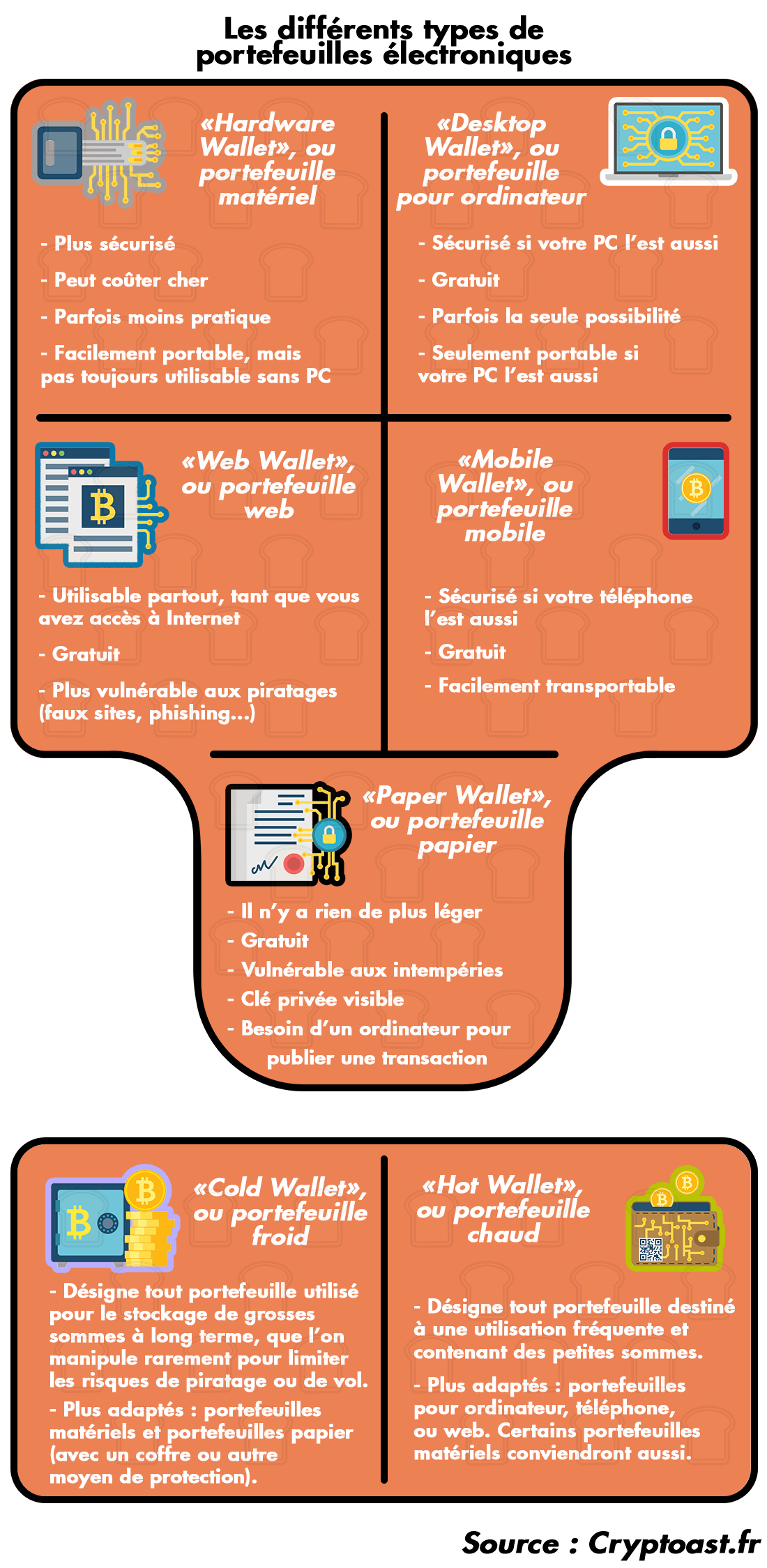Blockchain Wallet
Fleeting- External reference: https://www.ledger.com/academy/what-is-a-crypto-wallet
- External reference: https://en.wikipedia.org/wiki/Cryptocurrency_wallet
blockchain wallet, a polysemic word.
In blockchains, a wallet is anything that provides enough information to manipulate some value on the blockchain on behalf of an account. In concrete terms, it is anything that is used to manipulate the private key of an account.
The analogy with a real life wallet is that in real life, we store cards in a wallet and those cards are also used to manipulate real money on behalf of the card owner.
I’ve heard people use this word to say several related things1:
- a software that stores the private key: software wallet. If it only store secrets, I’d rather call it password manager.
- a device that stores the private key: hardware wallet.
- a piece of paper that stores the private key, generally using seed words: paper wallet.
- an online service that deals with blockchains on behalf of users: exchange or crypto-bank.
- a software that a user uses to deal with blockchains.
- a website that communicate with the blockchain while leaving the key on your browser: web wallet. In other terms, a web wallet is basically a progressive web app software wallet.
- an online node contributing to the blockchain network: complete node.
- the private key itself,
By extension, people also use this term to refer to:
- the amount associated to a particular address in a cryptocurrency,
- the amount associated to a particular address in a cryptocurrency token,
- the access to some smart-contract that is not a cryptocurrency token, (like a multisig token).
- any combination of the above.
A wallet can be hot or cold.
- a hot wallet is meant to be used while connected to the internet,
- a cold wallet is meant to be used offline,
The fact that people use the term wallet to refer to the keys, the program that stores the key, or the association with some value in the underlying technology makes conversations very difficult.
IRL, someone would say “I took my card out of my wallet to get some money from my bank account using an ATM so as to pay in the vending machine”. The card is the support for the private key, the ATM is the intermediate to access your money (like a smart contract), the bank account is the association from your identity to your money and the vending machine is another intermediate (like another smart contract). Therefore, in blockchain lingo, the same sentence would be “I took my wallet out of my wallet to get some money from my wallet using a wallet so as to pay in the wallet”.
A piece of advice: when someone talks about a wallet, make sure you understand about which context this person is talking. And try as much as possible not to use that word, or chances are you will have only the feeling that you are understood.

quotes
A cryptocurrency wallet is a device, physical medium, program or a service which stores the public and/or private keys for cryptocurrency transactions. In addition to this basic function of storing the keys, a cryptocurrency wallet more often also offers the functionality of encrypting and/or signing information.
MetaMask is a software cryptocurrency wallet used to interact with the Ethereum blockchain
In the following example, nothing tells whether here wallet means “private keys on your computer” or “account at arianee”
// Create a wallet const wallet = arianee.fromRandomKey();
Hot wallets or online wallets are cryptocurrency wallets that are connected to the internet and the blockchain at all times. This means, when you use a hot wallet, your private keys to access your cryptocurrencies are stored on an internet-connected application.
A cold wallet is an offline cryptocurrency wallet that stores the private keys to your cryptocurrency funds in a more secure manner, away from the internet. Even if you make transactions from a cold wallet, the wallet confirms the transactions in an offline environment. This process helps keep your private keys away from the internet at all times.
les portefeuilles (ou wallets), ces programmes qui vous permettent de gérer vos cryptomonnaies
tellement de portefeuilles différents sur le marché qu’il est bien difficile de faire son choix lorsqu’on débute
deux catégories distinctes : les hot wallets et les cold wallet
hot wallet (« portefeuille chaud ») sera directement connecté à Internet […] cold wallet (« portefeuille froid ») ne le sera pas
cold wallet d’offrir une sécurité maximale en réduisant considérablement la surface d’attaque pour un pirate informatique
un portefeuille, parfois aussi appelé porte-monnaie, est un appareil ou programme dont la fonction est de gérer des cryptomonnaies. Il permet d’en recevoir, d’en envoyer et bien sûr de les conserver
l’interface faisant le lien entre le monde réel et les protocoles crypto-monétaires comme Bitcoin ou Ethereum
procédé de stockage des pièces de cryptomonnaie, ou plus précisément des clés privées qui contrôlent ces pièces
portefeuilles sont donc en réalité des porte-clés : il peut s’agir d’une feuille de papier sur laquelle sont inscrites les clés privées, d’un fichier informatique, ou plus généralement du logiciel ou de l’appareil qui gère ces clés.
conserver les clés privées d’un utilisateur
plateforme d’échange centralisée n’est pas un portefeuille à proprement parler : ces plateformes conservent les clés privées de leurs utilisateurs à des fins de sécurité et de facilité d’usage
plus judicieux de parler de crypto-banques,
hot wallets (« portefeuilles chauds ») sont des solutions de stockage à chaud des clés privées, c’est-à-dire des solutions qui utilisent des appareils directement connectés à Internet
portefeuille logiciel (software wallet
hot wallets regroupe différents types de portefeuilles : les nœuds complets, les portefeuilles légers, les extensions de navigateur et les portefeuilles web
nœud complet, aussi appelé client complet, est le premier type de wallet ayant jamais existé
portefeuilles dits « légers » sont des nœuds qui ne téléchargent pas la chaîne de blocs et qui procèdent à une vérification simplifiée des transactions qui ne nécessite que peu de ressources informatiques. Ils sont souvent appelés portefeuilles SPV, le SPV signifiant Simplified Payment Verification
hot wallets est celle des portefeuilles web.
interfaces en ligne permettant de gérer des fonds.
clés privées lorsque vous utilisez ce type de service : celles-ci sont gérées par votre navigateur et ne sont jamais révélées à autrui.
Les portefeuilles matériels (hardware wallets
appareils dont la spécificité est de générer et de conserver les clés privées de manière isolée et de permettre de signer des transactions hors-ligne. Il s’agit aujourd’hui de la solution la plus sûre de détenir des cryptomonnaies.
paper wallets) Les portefeuilles papier sont les portefeuilles les plus simples qu’on puisse imaginer : il s’agit d’une clé privée et de l’adresse qui lui correspond imprimées sur une feuille de papier. Notez que l’information secrète peut également être une phrase mnémotechnique.
—
Notes linking here
- cold wallet
- cryptocurrency token
- custody
- do blockchain enthusiasts like making things look complicated?
- hardware security module
- hardware wallet
- keyring vs wallet
- ledger nano
- metamask
- misconceptions about wallets, tokens and keys
- password manager
- portefeuille, phrase secrète et génération d’adresses
- software wallet
- temple wallet
- tezos API gateway
- web wallet
Permalink
-
see also
↩︎In web3, people commonly use wallet as shorthand to refer to a blockchain account, crypto account, or wallet address.
